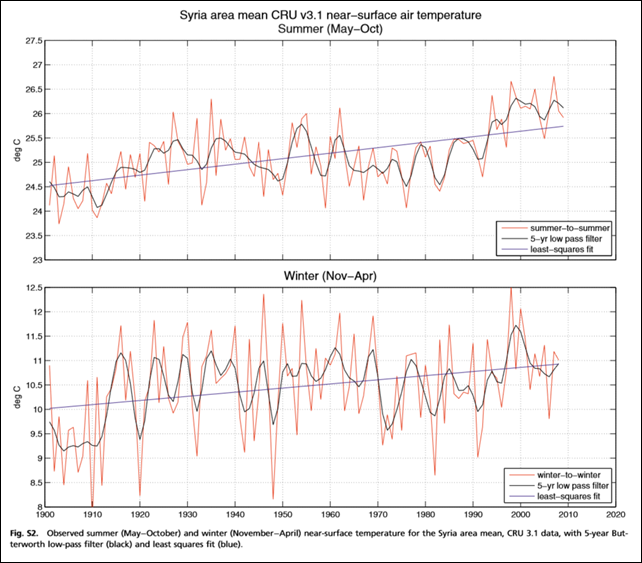Global warming contributed to Syria’s 2011 uprising, scientists claim – Severe drought ‘more than twice as likely as a consequence of human interference in the climate system’
By Ian Sample
2 March 2015 (The Guardian) – The prolonged and devastating drought that sparked the mass migration of rural workers into Syrian cities before the 2011 uprising was probably made worse by greenhouse gas emissions, US scientists say. The study is one of the first to implicate global warming from human activities as one of the factors that played into the Syrian conflict which is estimated to have claimed more than 190,000 lives. The severity of the 2006 to 2010 drought, and more importantly the failure of Bashar al-Assad’s regime to prepare, or respond to it effectively, exacerbated other tensions, from unemployment to corruption and inequality, which erupted in the wake of the Arab spring revolutions, the scientists say. “We’re not arguing that the drought, or even human-induced climate change, caused the uprising,” said Colin Kelley at the University of California in Santa Barbara. “What we are saying is that the long term trend, of less rainfall and warmer temperatures in the region, was a contributing factor, because it made the drought so much more severe.” From 2006, the Fertile Crescent, where farming was born 12,000 years ago, faced the worst three-year drought in the instrumental record. Unsustainable agricultural policies meant that the drought led to the broad collapse of farming in northeastern Syria. Their livelihoods gone, an estimated one to 1.5 million people surged into the cities. The arrival of so many rural families came on the heels of a million Iraqi refugees who arrived after 2006, causing what Kelley refers to as a “huge population shock” in Syria’s most affected urban centres. Many of the displaced settled on the edges of cities, where already tough living conditions were made more challenging by poor access to water and electricity. Writing in the journal, Proceedings of the National Academy of Sciences, Kelley describes how the unsustainable farming practices in Syria led to a massive depletion of groundwater which was crucial for irrigating land beyond the reaches of the rivers. But the dwindling groundwater was accompanied by a long term decline in rainfall in the region that affected farms watered from rivers. According to records Kelley studied, the Fertile Crescent, including Syria, witnessed a 13% drop in its winter rainfall since 1931. Another trend saw summer temperatures rising, which dried out much of the remaining moisture in the soils. [more]
Global warming contributed to Syria’s 2011 uprising, scientists claim 
ABSTRACT: Before the Syrian uprising that began in 2011, the greater Fertile Crescent experienced the most severe drought in the instrumental record. For Syria, a country marked by poor governance and unsustainable agricultural and environmental policies, the drought had a catalytic effect, contributing to political unrest. We show that the recent decrease in Syrian precipitation is a combination of natural variability and a long-term drying trend, and the unusual severity of the observed drought is here shown to be highly unlikely without this trend. Precipitation changes in Syria are linked to rising mean sea-level pressure in the Eastern Mediterranean, which also shows a long-term trend. There has been also a long-term warming trend in the Eastern Mediterranean, adding to the drawdown of soil moisture. No natural cause is apparent for these trends, whereas the observed drying and warming are consistent with model studies of the response to increases in greenhouse gases. Furthermore, model studies show an increasingly drier and hotter future mean climate for the Eastern Mediterranean. Analyses of observations and model simulations indicate that a drought of the severity and duration of the recent Syrian drought, which is implicated in the current conflict, has become more than twice as likely as a consequence of human interference in the climate system.
Climate change in the Fertile Crescent and implications of the recent Syrian drought
